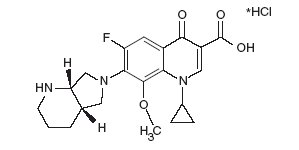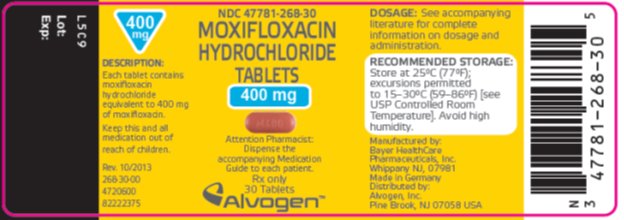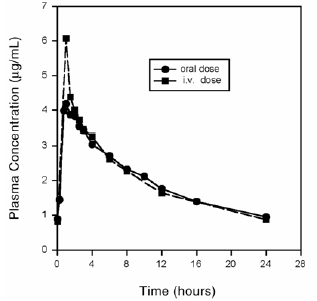Nutrients from the food that you eat passes to your breast milk. Its good idea to take healthy diet while breastfeeding. You may need to consume more calories per day to support healthy body system. Some time it gets necessary take medicine while you are breastfeeding and as other food items passes into breast milk, medicine passes as well hence it becomes obvious to understand its effects while breastfeeding. We have analyzed many medications and in this sheet we will present some fact and known information associated with Moxifloxacin Hydrochloride | Alvogen, Inc. while breast-feeding.
What is Moxifloxacin Hydrochloride | Alvogen, Inc. used for?
Moxifloxacin Hydrochloride is a fluoroquinolone antibacterial indicated for treating infections in adults 18 years of age and older caused by designated susceptible bacteria, in the conditions listed below: •Community Acquired Pneumonia ( 1.1) •Skin and Skin Structure Infections: Uncomplicated ( 1.2 ) and Complicated ( 1.3 ) •Complicated Intra-Abdominal Infections (1.4) •Plague (1.5) •Acute Bacterial Sinusitis ( 1.6 ) •Acute Bacterial Exacerbation of Chronic Bronchitis ( 1.7 ) To reduce the development of drug-resistant bacteria and maintain the effectiveness of Moxifloxacin Hydrochloride and other antibacterial drugs. Moxifloxacin Hydrochloride should be used only to treat or prevent infections that are proven or strongly suspected to be caused by susceptible bacteria. ( 1.8) 1.1 Community Acquired Pneumonia Moxifloxacin Hydrochloride is indicated in adult patients for the treatment of Community Acquired Pneumonia caused by susceptible isolates of Streptococcus pneumoniae (including multi-drug resistant Streptococcus pneumoniae [MDRSP]), Haemophilus influenzae, Moraxella catarrhalis, methicillin-susceptible Staphylococcus aureus, Klebsiella pneumoniae, Mycoplasma pneumoniae, or Chlamydophila pneumoniae [see Clinical Studies ( 14.3 )]. MDRSP isolates are isolates resistant to two or more of the following antibacterial drugs: penicillin (minimum inhibitory concentrations [MIC] ≥ 2 mcg/mL), 2nd generation cephalosporins (for example, cefuroxime), macrolides, tetracyclines, and trimethoprim/sulfamethoxazole. 1.2 Uncomplicated Skin and Skin Structure Infections Moxifloxacin Hydrochloride is indicated in adult patients for the treatment of Uncomplicated Skin and Skin Structure Infections caused by susceptible isolates of methicillin-susceptible Staphylococcus aureus or Streptococcus pyogenes [see Clinical Studies ( 14.4 )]. 1.3 Complicated Skin and Skin Structure Infections Moxifloxacin Hydrochloride is indicated in adult patients for the treatment of Complicated Skin and Skin Structure Infections caused by susceptible isolates of methicillin-susceptible Staphylococcus aureus, Escherichia coli, Klebsiella pneumoniae, or Enterobacter cloacae [see Clinical Studies ( 14.5 )]. 1.4 Complicated Intra-Abdominal Infections Moxifloxacin Hydrochloride is indicated in adult patients for the treatment of Complicated Intra-Abdominal Infections (cIAI) including polymicrobial infections such as abscess caused by susceptible isolates of Escherichia coli, Bacteroides fragilis, Streptococcus anginosus, Streptococcus constellatus, Enterococcus faecalis, Proteus mirabilis, Clostridium perfringens, Bacteroides thetaiotaomicron, or Peptostreptococcus species [see Clinical Studies ( 14.6 )]. 1.5 Plague Moxifloxacin Hydrochloride is indicated in adult patients for the treatment of plague, including pneumonic and septicemic plague, due to susceptible isolates of Yersinia pestis and prophylaxis of plague in adult patients. Efficacy studies of moxifloxacin could not be conducted in humans with plague for feasibility reasons. Therefore this indication is based on an efficacy study conducted in animals only [see Clinical Studies ( 14.7 )]. 1.6 Acute Bacterial Sinusitis Moxifloxacin Hydrochloride is indicated in adult patients (18 years of age and older) for the treatment of acute bacterial sinusitis (ABS) caused by susceptible isolates of Streptococcus pneumoniae, Haemophilus influenzae, or Moraxella catarrhalis [see Clinical Studies (14.1)]. Because fluoroquinolones, including Moxifloxacin Hydrochloride, have been associated with serious adverse reactions [see Warnings and Precautions (5.1-5.13)] and for some patients ABS is self-limiting, reserve Moxifloxacin Hydrochloride for treatment of ABS in patients who have no alternative treatment options. 1.7 Acute Bacterial Exacerbation of Chronic Bronchitis Moxifloxacin Hydrochloride is indicated in adult patients for the treatment of Acute Bacterial Exacerbation of Chronic Bronchitis (ABECB) caused by susceptible isolates of Streptococcus pneumoniae, Haemophilus influenzae, Haemophilus parainfluenzae, Klebsiella pneumoniae, methicillin-susceptible Staphylococcus aureus, or Moraxella catarrhalis [see Clinical Studies (14.2)]. Because fluoroquinolones, including Moxifloxacin Hydrochloride, have been associated with serious adverse reactions [see Warnings and Precautions (5.1-5.13)] and for some patients ABECB is self-limiting, reserve Moxifloxacin Hydrochloride for treatment of ABECB in patients who have no alternative treatment options. 1.8 Usage To reduce the development of drug-resistant bacteria and maintain the effectiveness of Moxifloxacin Hydrochloride and other antibacterial drugs, Moxifloxacin Hydrochloride should be used only to treat or prevent infections that are proven or strongly suspected to be caused by susceptible bacteria. When culture and susceptibility information are available, they should be considered in selecting or modifying antibacterial therapy. In the absence of such data, local epidemiology and susceptibility patterns may contribute to the empiric selection of therapy.
I am currently breastfeeding and I want to know if using Moxifloxacin Hydrochloride | Alvogen, Inc. is safe for my kid? Does it have any effect on milk production?
Moxifloxacin Hydrochloride | Alvogen, Inc. contains only one active ingredient that is Moxifloxacin. We have analyzed the usage of Moxifloxacin in breastfeeding and our analysis suggest that Moxifloxacin poses Low risk for infant while breastfeeding and hence Moxifloxacin Hydrochloride | Alvogen, Inc. itself shall be considered Low risk item for breastfeeding.
Moxifloxacin Hydrochloride | Alvogen, Inc. Breastfeeding Analsys
Low RiskCAS Number: 151096-09-2
It is a Fluoroquinolone-type antibiotic which is similar to Ciprofloxacin on both characteristics and indications. At latest update, relevant published data on excretion into breast milk were not found. Until more data on this medication is available, safer alternative drugs are preferred, especially in such critical age periods. Should a Fluoroquinolone-type antibiotic be necessary, Norfloxacin, Ofloxacin or Ciprofloxacin are preferred since they achieve the lowest levels in the plasma. When topically applied, as with eye drops, the small dose used and limited absorption to the plasma, which is common for most ophthalmic preparations, it is excreted in a non-significant amount into breast milk. In addition, quinolone-type medications have been used in neonates and infants without overt side effects (joint, bone or teeth impairment). It is excreted in tiny amounts into breast milk. Absorption through the child’s gut may be interfered by the calcium contained in the milk. Because of one case of pseudomembranous colitis that has been described possibly related to mother ingestion of Ciporfloxacine in a premature infant previously affected of NEC, a close follow-up looking for diarrhea is warranted. Be aware of the risk for false negative results of bacterial cultures in the infant, when the mother is taking antibiotics.
Moxifloxacin Hydrochloride | Alvogen, Inc. Breastfeeding Analsys - 2
CAS Number: 151096-09-2

No information is available on the use of moxifloxacin during breastfeeding. Fluoroquinolones have traditionally not been used in infants because of concern about adverse effects on the infants' developing joints. However, recent studies indicate little risk.[1][2] The calcium in milk might prevent absorption of the small amounts of fluoroquinolones in milk,[3] but insufficient data exist to prove or disprove this assertion. Use of moxifloxacin is acceptable in nursing mothers with monitoring of the infant for possible effects on the gastrointestinal flora, such as diarrhea or candidiasis (thrush, diaper rash). However, it is preferable to use an alternate drug for which safety information is available. Maternal use of an eye drop that contains moxifloxacin presents negligible risk for the nursing infant. To substantially diminish the amount of drug that reaches the breastmilk after using eye drops, place pressure over the tear duct by the corner of the eye for 1 minute or more, then remove the excess solution with an absorbent tissue.

I am nursing mother and I have already used Moxifloxacin Hydrochloride | Alvogen, Inc., what should I do?
Moxifloxacin Hydrochloride | Alvogen, Inc. is in the category of low risk, if you have already used it then its not a big deal if health and behavior of baby is good. However your health care provider shall be aware of the fact that you have used Moxifloxacin Hydrochloride | Alvogen, Inc. so you should inform him based on your convenience.
My health care provider has asked me to use Moxifloxacin Hydrochloride | Alvogen, Inc., what to do?
Moxifloxacin Hydrochloride | Alvogen, Inc. comes in category of low risk and if your doctor is aware that you are breastfeeding it should be ok to use without much concerns.
If I am using Moxifloxacin Hydrochloride | Alvogen, Inc., will my baby need extra monitoring?
Not much monitoring required while using Moxifloxacin Hydrochloride | Alvogen, Inc.
Who can I talk to if I have questions about usage of Moxifloxacin Hydrochloride | Alvogen, Inc. in breastfeeding?
US
National Womens Health and Breastfeeding Helpline: 800-994-9662 (TDD 888-220-5446) 9 a.m. and 6 p.m. ET, Monday through Friday
UK
National Breastfeeding Helpline: 0300-100-0212 9.30am to 9.30pm, daily
Association of Breastfeeding Mothers: 0300-330-5453
La Leche League: 0345-120-2918
The Breastfeeding Network supporter line in Bengali and Sylheti: 0300-456-2421
National Childbirth Trust (NCT): 0300-330-0700
Australia
National Breastfeeding Helpline: 1800-686-268 24 hours a day, 7 days a week
Canada
Telehealth Ontario for breastfeeding: 1-866-797-0000 24 hours a day, 7 days a week




